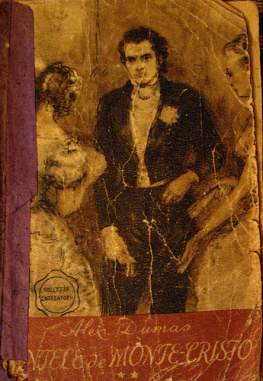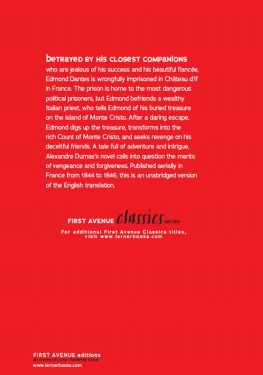(This is the essay entitled The Man in the Iron Mask, not the novel
The Man in the Iron Mask [The Novel] Dumas #28[nmaskxxx.xxx]2759])
F or nearly one hundred years this curious problem has exercised the imagination of writers of fictionand of drama, and the patience of the learned in history. No subject is more obscure and elusive, and none more attractive to the general mind. It is a legend to the meaning of which none can find the key and yet in which everyone believes. Involuntarily we feel pity at the thought of that long captivity surrounded by so many extraordinary precautions, and when we dwell on the mystery which enveloped the captive, that pity is not only deepened but a kind of terror takes possession of us. It is very likely that if the name of the hero of this gloomy tale had been known at the time, he would now be forgotten. To give him a name would be to relegate him at once to the ranks of those commonplace offenders who quickly exhaust our interest and our tears. But this being, cut off from the world without leaving any discoverable trace, and whose disappearance apparently caused no voidthis captive, distinguished among captives by the unexampled nature of his punishment, a prison within a prison, as if the walls of a mere cell were not narrow enough, has come to typify for us the sum of all the human misery and suffering ever inflicted by unjust tyranny.
Who was the Man in the Mask? Was he rapt away into this silent seclusion from the luxury of a court, from the intrigues of diplomacy, from the scaffold of a traitor, from the clash of battle? What did he leave behind? Love, glory, or a throne? What did he regret when hope had fled? Did he pour forth imprecations and curses on his tortures and blaspheme against high Heaven, or did he with a sigh possess his soul in patience?
The blows of fortune are differently received according to the different characters of those on whom they fall; and each one of us who in imagination threads the subterranean passages leading to the cells of Pignerol and Exilles, and incarcerates himself in the Iles Sainte-Marguerite and in the Bastille, the successive scenes of that long-protracted agony will give the prisoner a form shaped by his own fancy and a grief proportioned to his own power of suffering. How we long to pierce the thoughts and feel the heart-beats and watch the trickling tears behind that machine-like exterior, that impassible mask! Our imagination is powerfully excited by the dumbness of that fate borne by one whose words never reached the outward air, whose thoughts could never be read on the hidden features; by the isolation of forty years secured by two-fold barriers of stone and iron, and she clothes the object of her contemplation in majestic splendour, connects the mystery which enveloped his existence with mighty interests, and persists in regarding the prisoner as sacrificed for the preservation of some dynastic secret involving the peace of the world and the stability of a throne.
And when we calmly reflect on the whole case, do we feel that our first impulsively adopted opinion was wrong? Do we regard our belief as a poetical illusion? I do not think so; on the contrary, it seems to me that our good sense approves our fancys flight. For what can be more natural than the conviction that the secret of the name, age, and features of the captive, which was so perseveringly kept through long years at the cost of so much care, was of vital importance to the Government? No ordinary human passion, such as anger, hate, or vengeance, has so dogged and enduring a character; we feel that the measures taken were not the expression of a love of cruelty, for even supposing that Louis XIV were the most cruel of princes, would he not have chosen one of the thousand methods of torture ready to his hand before inventing a new and strange one? Moreover, why did he voluntarily burden himself with the obligation of surrounding a prisoner with such numberless precautions and such sleepless vigilance? Must he not have feared that in spite of it all the walls behind which he concealed the dread mystery would one day let in the light? Was it not through his entire reign a source of unceasing anxiety? And yet he respected the life of the captive whom it was so difficult to hide, and the discovery of whose identity would have been so dangerous. It would have been so easy to bury the secret in an obscure grave, and yet the order was never given. Was this an expression of hate, anger, or any other passion? Certainly not; the conclusion we must come to in regard to the conduct of the king is that all the measures he took against the prisoner were dictated by purely political motives; that his conscience, while allowing him to do everything necessary to guard the secret, did not permit him to take the further step of putting an end to the days of an unfortunate man, who in all probability was guilty of no crime.
Courtiers are seldom obsequious to the enemies of their master, so that we may regard the respect and consideration shown to the Man in the Mask by the governor Saint-Mars, and the minister Louvois, as a testimony, not only to his high rank, but also to his innocence.
For my part, I make no pretensions to the erudition of the bookworm, and I cannot read the history of the Man in the Iron Mask without feeling my blood boil at the abominable abuse of powerthe heinous crime of which he was the victim.
A few years ago, M. Fournier and I, thinking the subject suitable for representation on the stage, undertook to read, before dramatising it, all the different versions of the affair which had been published up to that time. Since our piece was successfully performed at the Odeon two other versions have appeared: one was in the form of a letter addressed to the Historical Institute by M. Billiard, who upheld the conclusions arrived at by Soulavie, on whose narrative our play was founded; the other was a work by the bibliophile Jacob, who followed a new system of inquiry, and whose book displayed the results of deep research and extensive reading. It did not, however, cause me to change my opinion. Even had it been published before I had written my drama, I should still have adhered to the idea as to the most probable solution of the problem which I had arrived at in 1831, not only because it was incontestably the most dramatic, but also because it is supported by those moral presumptions which have such weight with us when considering a dark and doubtful question like the one before us. It will, be objected, perhaps, that dramatic writers, in their love of the marvellous and the pathetic, neglect logic and strain after effect, their aim being to obtain the applause of the gallery rather than the approbation of the learned. But to this it may be replied that the learned on their part sacrifice a great deal to their love of dates, more or less exact; to their desire to elucidate some point which had hitherto been considered obscure, and which their explanations do not always clear up; to the temptation to display their proficiency in the ingenious art of manipulating facts and figures culled from a dozen musty volumes into one consistent whole.
Our interest in this strange case of imprisonment arises, not alone from its completeness and duration, but also from our uncertainty as to the motives from which it was inflicted. Where erudition alone cannot suffice; where bookworm after bookworm, disdaining the conjectures of his predecessors, comes forward with a new theory founded on some forgotten document he has hunted out, only to find himself in his turn pushed into oblivion by some follower in his track, we must turn for guidance to some other light than that of scholarship; especially if, on strict investigation, we find that not one learned solution rests on a sound basis of fact.




